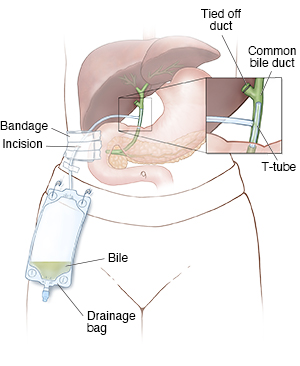A
B
C
D
E
F
G
H
I
J
K
L
M
N
O
P
Q
R
S
T
U
V
W
X
Y
Z
Click a letter to see a list of medical procedures beginning with that letter.
Click 'Back to Intro' to return to the beginning of this section.
Discharge Instructions: Caring for Your T-Tube
You have been discharged with a T-tube. This is a tube put into the bile duct after surgery. It's shaped like the letter T. It helps drain bile while the duct is healing. The tube may drain into a bag attached to your body. A bandage is on the site where the tube is placed. This protects the open area from infection. The T-tube will be left in place for up to several weeks. Before your tube can be removed, an X-ray will be done to make sure that your duct has healed and that there are no stones inside it. Here's what you can do at home to aid your recovery.

General guidelines
Tips to follow include:
-
Take care not to lie on the same side as the tube during sleep. This could compress it.
-
Secure the tube and bag inside your clothing. Your healthcare team can give you advice on how to do this. This will prevent the tube from being pulled out.
-
Keep the bandage and tube site dry when you shower. Ask your healthcare team about the best way to do this.
Emptying the bag
For most people, a T-tube is not connected to a drainage bag when you leave the hospital. The tube is closed. When a tube is closed, you should flush it once or twice a day. This is done with 10 mL sterile saline. You will need to use sterile methods to prevent infection. This means you need to clean the cap and the end of the tube with alcohol before injecting saline. Your healthcare team can give you instructions on how to do this.
If you have been discharged with your T-tube connected to a drainage bag, you will need to empty the bag at least twice a day. Empty it more often if needed. Follow these instructions:
-
Wash your hands for at least 20 seconds with clean, running water and soap.
-
Remove the closure at the bottom of the bag.
-
Drain the fluid into a measuring cup.
-
Record the amount of fluid each time you empty the bag. You will share this information with your healthcare provider on your next visit.
-
Replace the closure on the bottom of the bag.
-
Wash your hands again.
Changing the dressing
Change the dressing around the tube every day or if it becomes wet or soiled. To do this:
-
Wash your hands.
-
Remove the old bandage.
-
Wash your hands again.
-
Wet a cotton swab with normal saline solution (salt and water) or hydrogen peroxide. Clean around the incision and tube site. Or you can clean the skin around the T-tube with soapy water. Pat dry with clean gauze.
-
Put a new bandage on the incision and tube site. Make the bandage large enough to cover the whole incision area.
-
Tape the bandage in place.
Follow-up care
Make a follow-up appointment as directed by your healthcare provider.
When to call your healthcare provider
Call your healthcare provider right away if you have any of these:
-
Pain that gets worse, especially in the right upper portion of your belly
-
Nausea or vomiting
-
Fever above 100.4°F (38°C), or as directed by your provider
-
Chills
-
Swelling or fluid leaking around the tube
-
New redness or warmth around the incision
-
New fluid draining from the incision
-
An incision that does not heal after 3 to 5 days
-
Stitches that become infected (red or sore) or loose
-
A bad smell from the incision site
-
Fluid that is light pink to dark red
-
A tube that stops draining
-
A tube that is cracked
-
A tube that falls out
-
A yellow tint to your skin or eyes (jaundice)
Online Medical Reviewer:
Daphne Pierce-Smith RN MSN
Online Medical Reviewer:
Sabrina Felson MD
Date Last Reviewed:
9/1/2025
© 2000-2025 The StayWell Company, LLC. All rights reserved. This information is not intended as a substitute for professional medical care. Always follow your healthcare professional's instructions.